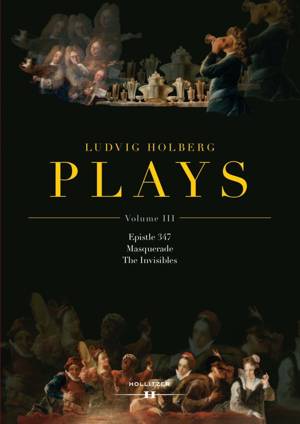
- Afhalen na 1 uur in een winkel met voorraad
- Gratis thuislevering in België vanaf € 30
- Ruim aanbod met 7 miljoen producten
- Afhalen na 1 uur in een winkel met voorraad
- Gratis thuislevering in België vanaf € 30
- Ruim aanbod met 7 miljoen producten
Zoeken
Ludvig Holberg: PLAYS, Volume III
Epistle 347 | Masquerade | The Invisibles
Hardcover | Engels
€ 34,95
+ 69 punten
Uitvoering
Omschrijving
Ludvig Holberg (1684-1754) is to Danish theatre what playwrights such as Shakespeare, Molière, Ibsen, Strindberg are to their national stages - and the world stage. During his lifetime, Holberg was a major figure in European literature and thought. In Denmark, his work forms the backdrop to writers such as Søren Kierkegaard, Hans Christian Andersen, Karen Blixen. The quality of Holberg'swriting, the universality of his themes, his understanding of stage and auditorium, more than qualify him to resume his place on the international stage.This third volume in a series of new translations presents Holberg's philosophical essay on the popular (but not with the authorities) masked entertainment of his day, the masquerade. Two plays then wittily expose and explore subtle negotiations around identity, gender, class, generation, each with particular focus on the mask as means of unmasking codes and conventions."Epistle 347" is a philosophical take on the carnivalesque masquerade as being 'truer' than the social roleplays, under the paradoxical maxim that "strictly speaking we are not truly masked except when bare faced".In the play "Masquerade", a patriarchal master of his house sees his hierarchical world order under threat from the young generation - and even his own wife! - enjoying 'useless' masked amusements. At the other end of the scale, the servant pays no heed to rules and hierarchies. Ultimately, however, they are all but pawns in a game of chance.In the ironic harlequinade "The Invisibles", a young gentleman falls in love with an 'invisible' (masked) lady. This noble case of amour causes the servant - Harlequin - to reassess his own wholesome, sensual relationship to his sweetheart - Columbine - and he finds their amour sadly lacking any sophistication. His ensuing high-flown attempts at imitating aristocratic courtesy cast an ambiguous light on the cultured protocols. It is up to female intelligence to remove the mask from the illusion."I never tire of reading Holberg's plays." (Henrik Ibsen, 1869)
Specificaties
Betrokkenen
- Vertaler(s):
- Uitgeverij:
Inhoud
- Aantal bladzijden:
- 148
- Taal:
- Engels
Eigenschappen
- Productcode (EAN):
- 9783990941690
- Uitvoering:
- Hardcover
- Afmetingen:
- 170 mm x 240 mm

Alleen bij Standaard Boekhandel
+ 69 punten op je klantenkaart van Standaard Boekhandel
Beoordelingen
We publiceren alleen reviews die voldoen aan de voorwaarden voor reviews. Bekijk onze voorwaarden voor reviews.







